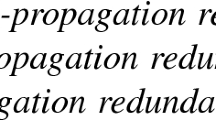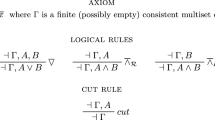Abstract
This paper focuses on the deduction theorem for propositional logic. We define and investigate different deduction properties and show that the presence of these deduction properties for strong proof systems is powerful enough to characterize the existence of optimal and even polynomially bounded proof systems. We also exhibit a similar, but apparently weaker condition that implies the existence of complete disjoint \(\mathsf{NP}\) -pairs. In particular, this yields a sufficient condition for the completeness of the canonical pair of Frege systems and provides a general framework for the search for complete \(\mathsf{NP}\) -pairs.
Similar content being viewed by others
References
Beyersdorff, O.: Classes of representable disjoint NP-pairs. Theor. Comput. Sci. 377, 93–109 (2007)
Beyersdorff, O.: The deduction theorem for strong propositional proof systems. In: Proc. 27th Conference on Foundations of Software Technology and Theoretical Computer Science. Lecture Notes in Computer Science, vol. 4855, pp. 241–252. Springer, Berlin (2007)
Beyersdorff, O.: Logical closure properties of propositional proof systems. In: Proc. 5th Conference on Theory and Applications of Models of Computation. Lecture Notes in Computer Science, vol. 4978, pp. 318–329. Springer, Berlin (2008)
Beyersdorff, O.: Tuples of disjoint NP-sets. Theory Comput. Syst. 43(2), 118–135 (2008)
Bonet, M.L.: Number of symbols in Frege proofs with and without the deduction rule. In: Clote, P., Krajíček, J. (eds.) Arithmetic, Proof Theory and Computational Complexity, pp. 61–95. Oxford University Press, Oxford (1993)
Bonet, M.L., Buss, S.R.: The deduction rule and linear and near-linear proof simulations. J. Symb. Log. 58(2), 688–709 (1993)
Bonet, M.L., Buss, S.R., Pitassi, T.: Are there hard examples for Frege systems? In: Clote, P., Remmel, J. (eds.) Feasible Mathematics II, pp. 30–56. Birkhäuser, Basel (1995)
Cook, S.A.: The complexity of theorem proving procedures. In: Proc. 3rd Annual ACM Symposium on Theory of Computing, pp. 151–158 (1971)
Cook, S.A., Reckhow, R.A.: The relative efficiency of propositional proof systems. J. Symb. Log. 44, 36–50 (1979)
Dowd, M.: Model-theoretic aspects of P≠NP. Unpublished manuscript (1985)
Glaßer, C., Selman, A.L., Sengupta, S.: Reductions between disjoint NP-pairs. Inf. Comput. 200(2), 247–267 (2005)
Glaßer, C., Selman, A.L., Sengupta, S., Zhang, L.: Disjoint NP-pairs. SIAM J. Comput. 33(6), 1369–1416 (2004)
Glaßer, C., Selman, A.L., Zhang, L.: Survey of disjoint NP-pairs and relations to propositional proof systems. In: Goldreich, O., Rosenberg, A.L., Selman, A.L. (eds.) Essays in Theoretical Computer Science in Memory of Shimon Even, pp. 241–253. Springer, Berlin (2006)
Glaßer, C., Selman, A.L., Zhang, L.: Canonical disjoint NP-pairs of propositional proof systems. Theor. Comput. Sci. 370, 60–73 (2007)
Grollmann, J., Selman, A.L.: Complexity measures for public-key cryptosystems. SIAM J. Comput. 17(2), 309–335 (1988)
Homer, S., Selman, A.L.: Oracles for structural properties: The isomorphism problem and public-key cryptography. J. Comput. Syst. Sci. 44(2), 287–301 (1992)
Köbler, J., Messner, J., Torán, J.: Optimal proof systems imply complete sets for promise classes. Inf. Comput. 184, 71–92 (2003)
Krajíček, J.: Bounded Arithmetic, Propositional Logic, and Complexity Theory. Encyclopedia of Mathematics and Its Applications, vol. 60. Cambridge University Press, Cambridge (1995)
Krajíček, J., Pudlák, P.: Propositional proof systems, the consistency of first order theories and the complexity of computations. J. Symb. Log. 54, 1063–1079 (1989)
Pudlák, P.: On reducibility and symmetry of disjoint NP-pairs. Theor. Comput. Sci. 295, 323–339 (2003)
Razborov, A.A.: On provably disjoint NP-pairs. Technical Report TR94-006, Electronic Colloquium on Computational Complexity (1994)
Sadowski, Z.: On an optimal propositional proof system and the structure of easy subsets of TAUT. Theor. Comput. Sci. 288(1), 181–193 (2002)
Author information
Authors and Affiliations
Corresponding author
Additional information
An extended abstract of this paper appeared in the proceedings of the conference FSTTCS 2007 [2]. Part of this work was done while at Humboldt-University Berlin, where the author was supported by DFG grant KO 1053/5-1.
Rights and permissions
About this article
Cite this article
Beyersdorff, O. The Deduction Theorem for Strong Propositional Proof Systems. Theory Comput Syst 47, 162–178 (2010). https://doi.org/10.1007/s00224-008-9146-6
Received:
Accepted:
Published:
Issue Date:
DOI: https://doi.org/10.1007/s00224-008-9146-6




